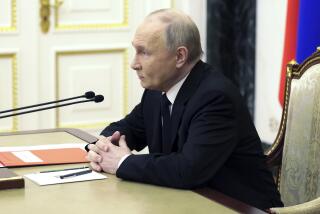Russia, Japan Set Target Date for Drafting World War II Peace Pact
- Share via
MOSCOW — Russia and Japan on Monday ordered their diplomats to come up with a proposed peace treaty and territorial settlement in time for Russian President Boris N. Yeltsin’s visit to Tokyo this autumn, Japanese officials said.
That common resolve, which could lead to the removal of the last stubborn barrier to normal relations between the countries--still technically at war--was reached at talks here between Yeltsin and visiting Japanese Foreign Minister Michio Watanabe.
The sides also agreed that Yeltsin will visit Tokyo for official talks Sept. 14-15.
With that deadline now in mind, Watanabe, Russian Foreign Minister Andrei V. Kozyrev and a bilateral working group are to “exert utmost efforts” to craft a mutually satisfactory deal, Japanese Foreign Ministry spokesman Seiji Morimoto said.
“Our minister expressed the sincere wish to reach a basic solution based upon the upcoming visit of Mr. Yeltsin,” Morimoto told a press briefing. “The working group is expected to reach a concrete draft peace treaty.”
Tokyo has consistently refused to sign a pact formally ending World War II hostilities with Moscow until the Kremlin relinquishes four islands off northern Japan that were seized by Soviet troops in 1945. But in recent weeks, the Japanese have shown a markedly more conciliatory spirit that makes an agreement suddenly seem more attainable.
For example, Japanese Foreign Ministry officials now indicate that Japan would be satisfied for the time being with a Russian declaration that the islands, which the Russians call the southern Kurils, are in fact Japanese territory. Details for their reversion could be worked out later.
“Once the sovereignty of Japan over these islands is recognized, we could be very flexible about the time frame and the modality of their return,” Morimoto confirmed.
Last month, Watanabe said his government could accept a phased return of what Japan calls the Northern Territories--the two smallest islands first, in exchange for a pledge by Russia to return the larger two later.
With Russia also seeking closer ties than ever to the West, Watanabe’s talks with Yeltsin and other officials confirmed the existence of “political will” on both sides to finally solve the nettlesome territorial dispute, Morimoto said.
In an official statement, the Russian Foreign Ministry said Yeltsin’s visit to Japan should be a major event and the beginning of a “cardinal improvement” in relations.
Japan had taken a hard line against providing large-scale international aid to Russia until the Northern Territories were returned, but it joined last month with other major industrial powers in approving a $24-billion financial assistance package.
Many Japanese now think it is the turn of Yeltsin’s government to show its gratitude.
In separate talks Monday with Russian Vice President Alexander V. Rutskoi, Watanabe made it clear that Japan would become a “full partner in the full sense of the word” only after conclusion of a peace treaty--that is, after resolving the territorial issue.
The Interfax news agency said Yeltsin remains attached to his own plan for a step-by-step settlement of the islands’ status, which includes granting Japan most-favored-nation privileges in trading with the islands, along with their demilitarization.
The Japanese said Yeltsin told them during the one-hour meeting Monday that the military pullback from the islands is almost complete; the local garrison included an artillery division and an air force fighter regiment.
Despite his diplomatic prowess, former Soviet President Mikhail S. Gorbachev was never able to close a deal with Tokyo on the islands that would have allowed full normalization of ties with Japan.
Now that the countries have fixed a “target date”--Yeltsin’s September visit, his first to Japan as leader of an independent Russia--they “will do their utmost” to reach an accord, Morimoto said.
More to Read
Sign up for Essential California
The most important California stories and recommendations in your inbox every morning.
You may occasionally receive promotional content from the Los Angeles Times.













